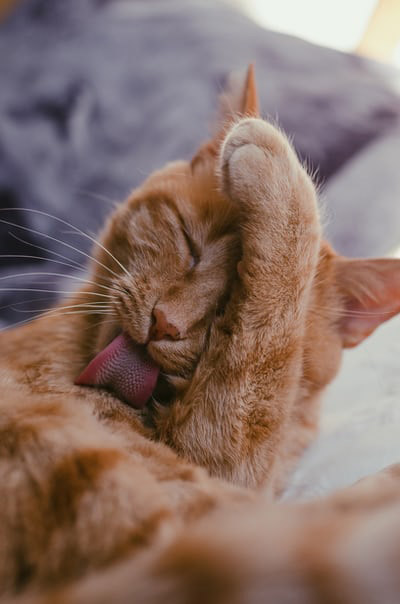Media – A Cat who Licks Off her Hair
Itching & Anxiety
Question:
I adopted an anxious 3 year old cat 3 years ago. Recently I’ve noticed Bella appears more anxious when I’m away from our home. She has been overgrooming to the point of slight bleeding.
Dr. Nichol:
Cats who lick their skin excessively are not happy campers. Denuding one’s body leads to issues with body image, an affliction many prefer to keep private. When you’re home with Bella she’s focused on enjoying your company. But, when she’s alone with her skin, it’s driving her @#%&* crazy!
Anxiety can cause a lonesome cat to self-mutilate but allergies, skin parasites and smoldering infections are a lot more common. A feline nervous wreck will get even more agitated by continual itching – everywhere on her body. Skin scrapings, impression smears, and allergy testing will be helpful. Suspected, but undocumented mange, can be ruled-out by treatment with a safe, topical medication called Bravecto. Only after Bella’s skin gets a clean bill of health should the critical eye be turned to her brain, where all behavior happens.
Be suspicious of a cat who insists on staying fully clothed, even on hot summer days. Take a careful look at her arm pits, inner thighs, and lower abdomen. This is intrusive and embarrassing but the first step for Bella will be to admit that she has a problem.
Separation anxiety isn’t uncommon. Beyond the overgrooming and hair loss, cats who pine away quietly are prone to urine soil during their person’s absence. Outdoor creatures who leer at Bella could also trigger a coping strategy like excessive licking. All indoor cats need a wonderland of feline behavioral opportunities like tall cat trees and multiple hide boxes. Go to my website (drjeffnichol.com) for a list Feline Environmental Enrichments.
Antianxiety medication may also be helpful for Bella but I recommend covert surveillance first. Shoot a video of the first 20 minutes following your departure from home. Yes, I know, another invasion of privacy, but gathering observations of your cat’s solitary behavior would open a window into her soul – and a diagnosis.
For help with behavior problems, you can sign-up for a Zoom Group Conference on my website, drjeffnichol.com.
Dr. Jeff Nichol is a residency-trained veterinary behaviorist. He provides consultations in-person and in groups by Zoom (505-792-5131). Each week he shares a blog and a Facebook Live video to help bring out the best in pets and their people. Sign up at no charge at drjeffnichol.com. Post pet behavioral or physical questions on facebook.com/drjeffnichol or by US Post to 4000 Montgomery Blvd. NE, Albuq, NM 87109.

